
The Basel Convention on the Control of Transboundary Movements of Hazardous Wastes and Their Disposal, usually known as the Basel Convention, is an international treaty that was designed to reduce the movements of hazardous waste between nations, and specifically to prevent transfer of hazardous waste from developed to less developed countries. It does not, however, address the movement of radioactive waste. The convention is also intended to minimize the rate and toxicity of wastes generated, to ensure their environmentally sound management as closely as possible to the source of generation, and to assist developing countries in environmentally sound management of the hazardous and other wastes they generate.

Flag of convenience (FOC) is a business practice whereby a ship's owners register a merchant ship in a ship register of a country other than that of the ship's owners, and the ship flies the civil ensign of that country, called the flag state. The term is often used pejoratively, and although common, the practice is sometimes regarded as contentious.
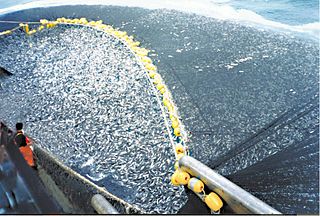
Overfishing is the removal of a species of fish from a body of water at a rate greater than that the species can replenish its population naturally, resulting in the species becoming increasingly underpopulated in that area. Overfishing can occur in water bodies of any sizes, such as ponds, wetlands, rivers, lakes or oceans, and can result in resource depletion, reduced biological growth rates and low biomass levels. Sustained overfishing can lead to critical depensation, where the fish population is no longer able to sustain itself. Some forms of overfishing, such as the overfishing of sharks, has led to the upset of entire marine ecosystems. Types of overfishing include growth overfishing, recruitment overfishing, and ecosystem overfishing.
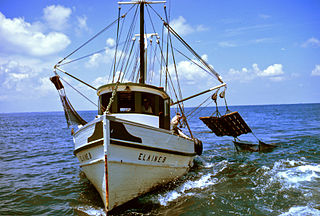
The fishing industry includes any industry or activity that takes, cultures, processes, preserves, stores, transports, markets or sells fish or fish products. It is defined by the Food and Agriculture Organization as including recreational, subsistence and commercial fishing, as well as the related harvesting, processing, and marketing sectors. The commercial activity is aimed at the delivery of fish and other seafood products for human consumption or as input factors in other industrial processes. The livelihood of over 500 million people in developing countries depends directly or indirectly on fisheries and aquaculture.

The African Nuclear-Weapon-Free Zone Treaty, also known as the Treaty of Pelindaba, establishes a Nuclear-Weapon-Free Zone in Africa. The treaty was signed in 1996 and came into effect with the 28th ratification on 15 July 2009.

Unsustainable fishing methods refers to the utilization of the various fishing methods in order to capture or harvest fish at a rate which sees the declining of fish populations over time. These methods are observed to facilitate the destructive fishing practices that destroy ecosystems within the ocean, and more readily results in overfishing, the depletion of fish populations at a rate that cannot be sustained.
A regional fishery body (RFB) is a type of international organization that is part of an international fishery agreement or arrangement to cooperate on the sustainable use and conservation of marine living resources and/or the development of marine capture fisheries whose such capacity has been recognized by the UN Food and Agriculture Organization under the United Nations Fish Stocks Agreement.
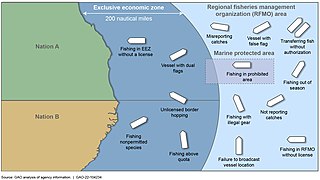
Illegal, unreported and unregulated fishing (IUU) is an issue around the world. Fishing industry observers believe IUU occurs in most fisheries, and accounts for up to 30% of total catches in some important fisheries.
The South East Atlantic Fisheries Organisation (SEAFO) is an organization that maintains controls over fishing and fishing related acts in the Southeastern Atlantic Ocean.
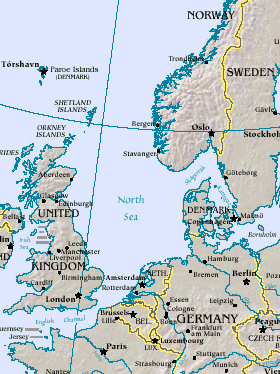
Fishing in the North Sea is concentrated in the southern part of the coastal waters. The main method of fishing is trawling.

The Moscow Summit was a summit meeting between U.S. President Ronald Reagan and General Secretary of the Communist Party of the Soviet Union Mikhail Gorbachev. It was held on May 29, 1988 – June 3, 1988. Reagan and Gorbachev finalized the Intermediate-Range Nuclear Forces Treaty (INF) after the U.S. Senate's ratification of the treaty in May 1988. Reagan and Gorbachev continued to discuss bilateral issues like Central America, Southern Africa, the Middle East and the pending withdrawal of Soviet troops from Afghanistan. Reagan and Gorbachev continued their discussions on human rights. The parties signed seven agreements on lesser issues such as student exchanges and fishing rights. A significant result was the updating of Soviet history books, which necessitated cancelling some history classes in Soviet secondary schools. In the end, Reagan expressed satisfaction with the summit.
A fisheries subsidy is a government action that confers an advantage on consumers or extractors of fish in order to supplement their income or lower their cost. Fisheries subsidy are addressed in sustainable development goal 14 where target 14.6 works on prohibiting subsidies contributing to overcapacity and over fishing, unreported and unregulated fishing and refrain from new such subsidies.
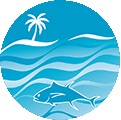
The Pacific Islands Forum Fisheries Agency (FFA) is an intergovernmental agency established in 1979 to facilitate regional co-operation and co-ordination on fisheries policies between its member states in order to achieve conservation and optimum utilisation of living marine resources, in particular highly migratory fish stocks, for the benefit of the peoples of the region, in particular the developing countries. The office campus is located in Honiara, Solomon Islands
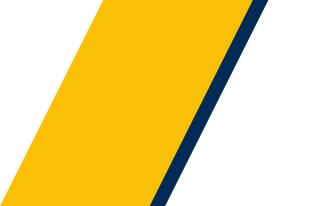
The Directorate General of Marine and Fisheries Resources Surveillance is a government agency under the management of the Ministry of Marine Affairs and Fisheries of Indonesia. Formally established on 23 November 2000 according to Presidential Decree No. 165/2000, the PSDKP is the agency responsible for supervising the marine and fishery resources of the Republic of Indonesia. The main mission of PSDKP is the prevention of Illegal, unreported and unregulated fishing in Indonesian waters, which has caused a substantial loss for Indonesia's fishing industry. In its mission to prevent illegal fishing, PSDKP has conducted joint-operations with the Indonesian Navy, Water Police, Sea and Coast Guard, the Maritime Security Agency and Customs. PSDKP is however is not associated with these agencies.

Andrey Dolgov is a former long-line fishing boat. During the 2000s and 2010s, the ship—which was engaged in a far-reaching campaign of illegal fishing—was one of Interpol's most wanted ships. The Andrey Dolgov was captured and detained by the Indonesian navy in April 2018; as of 2019 the Indonesian government intended to refurbish the ship and incorporate it into Indonesia's fisheries enforcement fleet.
Illegal, unreported and unregulated fishing (IUU) in the Arctic is an under researched scientific field. The most recent academic articles about IUU in the Arctic mainly concerns the mid-2000s.
Transshipment or transhipment at sea is done by transferring goods such as cargo, personnel, and equipment from one ship to another. It is a common practice in global fisheries and typically takes place between smaller fishing vessels and large specialized refrigerated transport vessels, also referred to as “reefers” that onload catch and deliver supplies if necessary.
The fishing industry in Thailand, in accordance with usage by The World Bank, the UN's Food and Agriculture Organization (FAO) and other multinational bodies, refers to and encompasses recreational fishing, aquaculture, and wild fisheries both onshore and offshore.
The Pacific Salmon War was a period of heightened tensions between Canada and the United States over the Pacific Salmon catch. It began in 1992 after the first Pacific Salmon Treaty, which had been ratified in 1985, expired, and lasted until a new agreement was signed in 1999. Disagreements were high in 1994, when a transit fee was set on American fishing vessels using the Inside Passage and a ferry was blockaded by fishing boats in Friday Harbor, Washington.
Fisheries crime describes the wide range of criminal activity that is common along the entire value chain of the fishing sector. It often occurs in conjunction with Illegal, unreported and unregulated fishing (IUU), but next to illegal fish extraction include for example corruption, document fraud, tax evasion, money laundering, kidnapping, human trafficking and drug trafficking. The issue recently received increased attention in the UN, Interpol, and several other international bodies.
 Albania
Albania Australia
Australia Bahamas
Bahamas Barbados
Barbados Canada
Canada Cape Verde
Cape Verde Chile
Chile Costa Rica
Costa Rica Cuba
Cuba Denmark
Denmark Djibouti
Djibouti Dominica
Dominica European Union
European Union France
France Gabon
Gabon Gambia
Gambia Ghana
Ghana Grenada
Grenada Guinea
Guinea Guyana
Guyana Iceland
Iceland Indonesia
Indonesia Japan
Japan Kenya
Kenya Madagascar
Madagascar Maldives
Maldives Mauritania
Mauritania Mauritius
Mauritius Montenegro
Montenegro Mozambique
Mozambique Myanmar
Myanmar Namibia
Namibia New Zealand
New Zealand Norway
Norway Oman
Oman Palau
Palau Panama
Panama Peru
Peru Philippines
Philippines Saint Kitts and Nevis
Saint Kitts and Nevis Saint Vincent and the Grenadines
Saint Vincent and the Grenadines Sao Tome and Principe
Sao Tome and Principe Senegal
Senegal Seychelles
Seychelles Somalia
Somalia South Africa
South Africa South Korea
South Korea Sri Lanka
Sri Lanka Sudan
Sudan Thailand
Thailand Togo
Togo Tonga
Tonga Turkey
Turkey United States
United States Uruguay
Uruguay Vanuatu
Vanuatu










